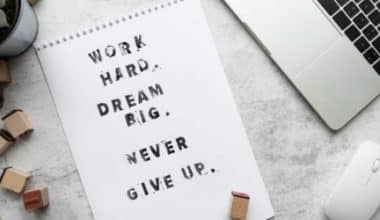If you’re like me, am sure you’ve experienced nervousness just thinking about a job interview. But don’t worry—I’m here today to provide some tips on how to face those nerve-racking interviews and come out victorious. Weaknesses—the dreaded issue that frequently makes us shiver in our seats in job interviews. Believe it or not, fixing your weaknesses during an interview can help you. It’s all in how you handle things, and I’m here to teach you how.
In this article, I’ll go over ways to overcome weaknesses during job interviews. I’ve got you covered on everything from knowing why employers ask about shortcomings to creating a convincing interview story.
Key Takeaways
- Weaknesses in job interviews are opportunities to showcase your self-awareness, growth mindset, and ability to overcome challenges.
- Be honest and authentic when discussing your weaknesses.
- Identify your weaknesses, develop an improvement plan, and demonstrate your commitment to growth.
- Practice, rehearse, and build confidence in your interview skills.
Understanding Weaknesses in Job Interviews

Come to think of it, weaknesses aren’t something to be ashamed of. We all have them, and admitting them is the first step toward progress. It’s time to admit our weaknesses and turn them into strengths.
As an educated candidate, I’m sure you have done your homework about the organization and prepared possible answers to the most important and typical interview questions, the most popular of which is “What is your greatest weakness?”
To that effect, I am certain you will not respond with, “I am too hardworking,” or “I am a perfectionist.” This is because it might come out as manufactured and false at best and as a lack of self-awareness at worst.
On the other hand, you don’t want to respond with weaknesses that will prevent you from succeeding in the role. For example, if you’re applying for a human resource management role, you shouldn’t say you’re “not very good with time management.”
Thankfully there are strategies for answering this question that will allow you to demonstrate your value as a candidate. Here, I’ve compiled several outstanding responses to the traditional question, “What is your greatest weakness?” – and don’t worry, these replies are not about “perfectionist tendencies.”
So, why do employers ask about your weaknesses?
Each of us has room for growth. According to recent research, 72% of hiring managers prefer applicants who can freely admit their weaknesses and demonstrate a growth strategy.
Think about their perspective. They want to know how you solve difficulties, how you learn from your mistakes, and, most importantly, how you approach self-development. In essence, your answer to the weakness question reveals much about your personality and work ethic.
What are Your Greatest Weaknesses?
The initial few minutes of a job interview are jam-packed with information. Things like arriving on time, dressing appropriately, and expressing confidence. However, your preparation shouldn’t stop there.
There is no doubt that first impressions count. This means recruiters form an opinion of you within minutes of meeting you based on the firmness of your handshake, your dress, and your body language.
As much as using your interview rules will get you off to an excellent start, you must also think about what happens after the introduction. In other words, having answers to common job interview questions beforehand will help you navigate through the rest of the meeting. A hiring manager’s primary goal is to look for,
#1. Self-Awareness
Everyone has weaknesses, but not everyone recognizes them. With this level of self-awareness, you’re likely to take advantage of your strengths, moderate your shortcomings, and control your emotions.
#2: Honesty
Interviewers can detect dishonesty by verbal and physical signs such as looking away often or responding in a weak voice. And if you’re dishonest about your weaknesses, they could assume you won’t be honest in your job.
#3. A Desire To Grow
Recognizing a weakness isn’t sufficient. The hiring manager wants to see if you’re willing to fix a flaw before it becomes a larger problem. Bear in mind, that weaknesses are not something to feel embarrassed about. Quite the contrary. Focusing on improvement indicates humility and determination, both of which are qualities that recruiters look for in prospective prospects. As well as evidence that you have a drive to improve upon your weaknesses. But while you think, ask yourself:
- What are your areas of weakness?
- How did you become aware of these weaknesses in yourself?
- How did you respond to that realization?
- What efforts are you taking to recognize that habit right now?
- What are you trying to change regarding this behavior?
The greatest responses to this question truly explain your weakness and demonstrate how you are actively working to improve.
Identifying Your Weaknesses In Job Interviews
I started my journey by going on a self-discovery mission. I examined myself carefully and saw areas for improvement. Even though, I struggled with procrastination and public speaking anxiety. Recognizing these weaknesses was the first step toward correcting them and I advise you to do the same. Alright, enough about me; let us get to work. How do you go about pinpointing such problematic flaws? Here are some pointers:
A. Self-Reflective Practices
Take out a pen and paper—it’s time for some reflection. Think about your previous interactions and find areas where you’ve experienced hardship. Perhaps you get apprehensive during presentations or struggle to manage your time. Whatever the case may be, accepting responsibility is the first step towards improvement.
B. Collect Feedback from Peers and Mentors
Sometimes we are unaware of our weaknesses. This is where friends, family, and mentors may help. Get in touch with them for honest feedback and have a willingness to listen. This is because their observations may surprise you and point out areas for improvement.
C. Understanding Trends and Triggers
Weaknesses do not exist by themselves; they are typically related to particular events or patterns of behavior. Are there any specific instances that tend to expose your flaws? For example, do you struggle with public speaking? Do you get stressed when faced with a tight deadline? Understanding these triggers can assist you to develop ways of dealing with them.
D. Think About the Work Requirements
Evaluate the job description and consider areas where you may lack expertise or knowledge. This might help you find areas where you could grow or learn new abilities.
Example Weaknesses In Job Interviews
You don’t want to reveal any deficiencies in response to a job interview question. Instead, think about the job requirements and the kinds of answers that will make hiring managers want to work with you. Then, choose the most honest answer to the question that will not make the recruitment manager question your suitability for the post.
Here are a few of my favorite examples of how to answer the question “What is your greatest weakness?” during job interviews and why they are effective.
#1. Too Much Attention to Details

Image by KamranAydinov on Freepik
Being detail-oriented is usually a desirable thing, but if you spend too much time on the details of a project, it could be viewed as a weakness. So, in your interview response, make sure to highlight how you’re making progress in this area by focusing on the big picture:
Potential reply: “My biggest weakness is that I tend to get too caught up in the details of a project and linger too long on the little details. However, by regularly checking in with myself and allowing myself to refocus on the bigger picture, I’ve been trying to get better in this area. In this manner, I can maintain quality control without sacrificing my output or the team’s capacity to meet the deadline.
#2. Impatience With Missed Deadlines

Image by wayhomestudio on Freepik
While expressing outward anxiety or displeasure about missing a deadline can be perceived as a weakness, employers value employees who prioritize deadlines and strive to keep projects on track.
But, if this is a weakness in your job interview, structure your response with emphasis on how much you love it when work is completed on time and how you are developing on your own while also contributing to the improvement of systems to get work done more effectively.
A possible reply may be: “My biggest weakness is that I become agitated when deadlines for projects are missed.” I am quite demanding about deadlines and find it difficult when projects are not completed on time. I’ve begun to be more proactive in preventing this, as well as evaluating my reactions to ensure that I’m encouraging people and increasing efficiency.
#3. Lack of Organization

Image by KamranAydinov on Freepik
Many people have disorganized desktops. Hence, this answer is effective because it addresses a relatable and fixable weakness. You point out that disorder does not interfere with your ability to execute your job, which is important, but you also admit that it may make you less efficient. To guarantee that you are functioning at your best, you explain personal efforts you’ve made to improve your organizational abilities only for self-improvement, indicating maturity and self-awareness.
Possible response: “I struggle with organizing. While it has never affected my performance, I have found that my sloppy desk and congested email still interfere with my productivity. Over time, I’ve learned to set aside time to organize my physical and digital space, and I’ve seen it improve my efficiency levels throughout the week.”
#4. Phobia of Public Speaking

In this example, you describe qualities that are not relevant to the role but that you have been attempting to improve. This demonstrates your excellent drive to address more business needs than are strictly required in your current position. Furthermore, it is impressive if you can demonstrate a willingness to contact your management with areas for development rather than waiting for your manager to recommend them to you. This is because it demonstrates a level of ambition and professional maturity.
Possible Response: I’m anxious when I speak in front of groups. Even though my job as a web designer doesn’t require me to speak in front of groups very often, I still think it’s a valuable ability, particularly when I want to voice my opinions in meetings. To fight this, I spoke with my boss, who suggested that I spend a few minutes discussing our project timeline, deadlines, and goals while creating a website for a customer at each team meeting. I can now speak in public with confidence and see it as a chance to support my teammates in doing their jobs well because of this practice.
Read Also: Public Speaking Skills: How To Be an Effective Speaker
#5. Harsh Self-Criticism

This answer is effective because your interviewer can relate; we all have severe inner critics. It’s also beneficial because 1) it suggests that you’re willing to work on your flaws outside of work, rather than just during business hours, and 2) it reveals that your inner critic may be correct. Knowing when to let it go is critical for avoiding burnout and increasing productivity. So, recognizing how the inner critic may hinder a strong work ethic demonstrates your want to learn and be an excellent employee.
Possible Response: There are moments when my inner critic is so devastating. Although I enjoy doing quality work, I don’t think I always feel content with it, which has in the past resulted in burnout. I’ve started to ignore this inner voice, though, by making time for self-care both before and after work. Additionally, I’m learning to know when to ignore my inner critic and when it is correct.
Tips to Answer What are Your Greatest Weaknesses
Now that you’ve learned the most effective answers and best methods for selecting a weakness, it’s time for the difficult part: delivering the response to the interviewer. Let’s go over a few tips for answering the question, “What is your greatest weakness?”
#1. Practice Your Response Ahead
Practice is not what makes perfect, but it does make better. While it is not inevitable that an interviewer will ask about your weaknesses, there is a good chance that they will. So, to prepare for that moment, practice the way you speak and the delivery of your answer with a buddy or in the mirror.
This is because there’s nothing worse than fumbling through an interview answer, especially for a question about weaknesses. It’s good to stutter a little – we all get nervous — but your response should be as clear and brief as possible. But, if you wander, fumble, or contradict your words, you will appear unprepared or, worse, lying.
#2. Project Self Confidence
Since you’ve likely prepared multiple times, this should come effortlessly, but we can’t emphasize it enough: when answering “What is your weakness?” strive to establish eye contact with the interviewer for most of the answer and display confidence while speaking.
Therefore, project confidence while talking about my weakness?” that’s a question you can pose. Yes! You want to own up to your most pressing areas for improvement, not appear intimidated or terrified by your flaws, or that your self-esteem has decreased substantially. (Hint: It could have happened, which is fine, but your interviewer should not be aware of it). You can take comfort in the fact that you are not alone. We all have areas of weakness that we need to improve.
In addition to that, you can boost your confidence in your response by discussing how you’ve been working on this problem. In fact, by focusing the majority of your response on how you’ve already improved in this area, you’ll appear more self-assured and accomplished by default.
#3. Be Brief and To the Point
You don’t want to focus on weaknesses so keep your response brief, between thirty seconds to one minute. Even so, only the first sentence should openly address your issue, with the rest of the response dedicated to the tools and strategies you’re using to solve it. Alternatively, you may tell a brief story about what you learned when dealing with that weakness in your personal life or business.
#4. Understand The Interviewer’s Goal
The interviewer’s goal is not to intimidate you or scare you, They are also not aiming to disqualify you due to your response. One of the most frequently asked behavioral interview questions is, “What is your greatest weakness?” It is simply another way for interviewers to learn about your soft personal and professional qualities.
They are not looking to see if you “completely suck” at the job you applied for; if you applied, you most likely meet the standards. They are also not looking to learn about your hard professional qualities and qualities; other interview questions and responses are better suited to that.
Instead, they want to know if you are self-aware enough to discover chances for development. Do you talk with composure when discussing your weaknesses? Do you cheerfully welcome feedback?
As a result, including examples of earlier feedback you’ve gotten, displaying confidence, and demonstrating that you’re taking measures to improve will be enough to earn you good marks on this subject.
#5. Don’t Stress Over Your Answers
Good news: Hiring decisions are not made based on your response to the inquiry, “What is your weakness?” It is shocking, I know! This appears to be the case at times, as the question can be loaded.
You don’t have to worry; As long as you’re honest and explain how you’re working to improve, this question will probably be low on your interviewer’s list, unless you lie about your weakness, employ a “fake” weakness like “I’m too organized,” or simply avoid the matter entirely.
#6. Showcase Your Personality while Keeping it Professional
Are you a funny person? How about a dry wit? You can mention part of it during this question, but only after assessing the corporate culture and the interviewer’s personality. I recommend that you keep humor to a minimum when applying for a high-level corporate position. Also, you can always display your personality through your intonation, tone, and delivery.
Strategies for Overcoming Weaknesses In Job Interviews

You are now ready for the actual interview! I’d be pleased to share my experience overcoming weaknesses with you during job interviews. It wasn’t always easy for me, but with dedication and effort, I was able to transform my weaknesses into strengths. Hence, I recommend the following ways to deal with weakness questions:
#1: Developing a Growth Mindset
It is not enough to admit and learn from your mistakes. You must also show that you have actively worked to improve. Discuss how you actively attempted to improve your flaws. This implies that you are eager to learn and grow in your career.
It’s time to adopt a growth mindset—the conviction that we can improve our skills through devotion and hard work. Rather than considering flaws as fixed characteristics, consider their possibilities for development and learning.
With my weaknesses exposed, I embraced a growth mentality. Instead of perceiving my flaws as fixed characteristics, I saw them as possibilities for improvement. Every stumble became an opportunity to learn and grow, bolstering my drive to succeed.
#2: Turning Weaknesses into Opportunities
Think of your limitations as an untapped potential that needs to be realized. Take my fear of public speaking, for example. Instead of letting that hold me back, I enrolled in a public speaking class and used it to my advantage.
I realized that defects are not inherently bad—they are simply areas where we may develop. Take my fear of public speaking, for example. Instead of allowing that to hold me back, I enrolled in a public speaking course and joined a Toastmasters club. Afterward, I gradually transformed my uneasiness into confidence, increasing my communication skills in the process.
#3. Developing Skills and Competencies
With a growth mindset, focus on developing abilities that will help you overcome your weaknesses. Whether it’s learning a new software program or improving your communication skills, each step takes you closer to interview success.
Just like me, with a renewed feeling of purpose, I set out to develop abilities that would boost my confidence during interviews. I committed time to learning industry-specific software, brushing up on technical knowledge, and honing my presentation abilities. Each modest accomplishment boosted my confidence and helped me get one step closer to my ambitions.
#4. Presenting Weaknesses Positively
When it came time to discuss my weaknesses during interviews, I reframed them as chances for progress. Rather than focusing on my past faults, I showed how I actively tried to overcome them. Employers valued my honesty and applauded my perseverance in the face of adversity. Likewise do not be afraid to discuss your weaknesses during job interviews. Instead, interpret them as chances for growth and advancement.
#5. Provide Concrete Examples and Solutions
When explaining your weaknesses, use specific examples from previous experiences. This shows that you’ve noticed your weaknesses and are actively working to improve. It also allows the interviewer to understand how you cope with problems and overcome obstacles.
Instead of meaningless common sense, I backed up my claims with actual examples. I gave examples of how I confronted challenges head-on and demonstrated my problem-solving ability in action. By proposing practical solutions to hypothetical challenges, I demonstrated my ability to think quickly and adapt to changing conditions.
Use the STAR approach to organize your response. Describe a specific situation in which your weakness was exposed, the work for which you were responsible, the efforts you took to improve, and the positive results you obtained. This is because quantifying your results whenever possible can help you illustrate your influence.
#6: Practicing and Rehearsing
To improve my interview abilities, I asked friends and family to perform practice interviews. These practice sessions were vital in helping me refine my responses and work out any errors in my delivery. With each rehearsal, my confidence improved, and I felt prepared to answer even the most difficult interview questions.
#7. Refining Responses and Body Language
Throughout the interviews, I concentrated on my verbal and nonverbal communication. I concentrated on making eye contact, speaking clearly and confidently, and using open body language to communicate my enthusiasm. In the end, I created a strong impression on prospective employers by presenting myself as a polished and professional candidate.
#8. Don’t be Arrogant Or Underestimate Yourself
The most important thing you can do while answering the question “What is your greatest weakness?” is to be confident in your answer. (If you have a lack of confidence, continue reading.) Even if you’re not particularly confident, I’m going to believe you’re honest with yourself. If you’ve recognized a vulnerability and are confident in your answer, let it shine through. There’s no reason to be ashamed about something you’re not particularly excellent at as long as you’re attempting to improve.
In other words, confidence is essential in any job interview, so improve it through practice and preparation. Remember that every interview, even if it does not go as planned, provides an opportunity to learn and progress.
What are your five weaknesses?
Impatience, multitasking, self-criticism, and procrastination are some of the qualities that can be utilized as defects. An honest remark can go a long way. As a result, the best technique is to identify your weaknesses and take decisive action to fix them.
Do weaknesses make you stronger?
Focusing On Your Weakness Is A Strength In Disguise
Is it better to focus on strengths or weaknesses?
Research shows that employees are happier when they are focused on their strengths rather than weaknesses. Employee engagement and performance increase while attrition lowers when you invest in developing an employee’s strengths.
Conclusion
So there you have it—my experience of overcoming weaknesses during job interviews. It wasn’t always easy, but it was certainly worthwhile. By owning my flaws, adopting a growth attitude, and putting in the effort, I went from a frightened mess to a confident, capable potential employee.
Whether you’re terrible with numbers or don’t speak up in group situations, there’s a strength behind every weakness. The power is in how you conquer it.
In addition to that, leaning on teammates who specialize in those areas is an excellent method to demonstrate that you will work well as a team and understand how to use your resources to solve challenges. Taking professional development classes shows that you are willing to work toward improvement.
Whatever responses you provide to the hiring professionals, they will be pleased to assist you in developing and exceeding the position’s objectives.
Remember that everyone has flaws; what distinguishes us is how we choose to address them. Owning your flaws and taking steps to rectify them will not cause you to hesitate. You, too, can fulfill your full potential and pursue your dream profession provided you are determined and willing to put in the necessary study time.
References
- indeed.com
- blog.hubspot.com
- deel.com
- betterup.com
- novoresume.com






